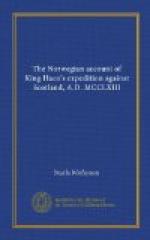The Scotch purposely declined any accommodation, because summer was drawing to a period, and the weather was becoming bad. Finding this, Haco sailed in, with all his forces, past the Cumbras.
Afterwards an interview in Scotland was agreed upon for a reconciliation. King Haco sent thither a Bishop and a Baron; and to meet them came some Knights and Monks. They spoke much about an accommodation, but, at last, things ended the same way as formerly. Towards the conclusion of the day a greater number of Scots convened from the country than the Norwegians thought were to be trusted. They therefore, retiring to the ships, waited on the King, and told him their opinion. The generality advised him to declare that the truce was now ended, and to give orders to plunder, as the army was very short of provisions.
King Haco, however, sent one of his courtiers, called Kolbein Rich, to the Scottish Monarch. He carried with him the Articles of pacification which the Scottish King had sent to King Haco, and was commanded to bring back the proposals which King Haco had sent to the King of Scotland. He was besides to propose that the Sovereigns should meet with all their forces and treat about a peace. If that, by the grace of God, took place, it was very well; but if it should turn out otherwise, then Haco proposed to the King of Scotland to fight, with their whole armies, and let him conquer whom God pleased. The Scottish Monarch seem’d not unwilling to fight, but he gave no explanation. Kolbein, therefore, returned back to his Sovereign, who appeared but little satisfied with his message; as is mentioned in the Ravens-ode.
12.
The Eastern Hero great in command, and ennobled by Victory, repeatedly offered the decisive conflict of Javelins to the enemy. The strangers, distrustful of their strength, risked not the combat against our magnanimous Prince, wielder of the gleaming blade.
The truce was now declared to be totally ended. The King accordingly sent sixty ships in to Loch-Long.[77] They were commanded by Magnus King of Man, King Dugal,[78]




